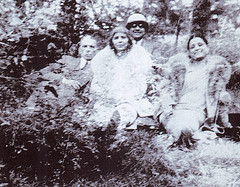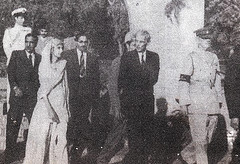Miss Fatima Jinnah – مادر ملت فاطمہ جناح

Early life and career
Fatima Jinnah was born in Karachi, British India on July 30, 1893. Jinnah’s parents, Poonja Jinnahbhai and Mithibai Jinnahbhai, had seven children: Muhammad Ali, Ahmad Ali, Bunde Ali, Rahmat Ali, Maryam, Fatima and Shireen. Of a family of seven brothers and sisters, she was the closest to Muhammad Ali Jinnah. Her illustrious brother became her guardian upon the death of their father in 1901. She joined the Bandra Convent in Bombay in 1902. In 1919 she got admitted to the highly competitive University of Calcutta where she attended the Dr. R. Ahmed Dental College. After she graduated, she opened a dental clinic in Bombay in 1923.
Quaid’s companion
Mr.Jinnah lived with her brother until 1918, when he married Rattanbai Petit. Upon Rattanbai’s death in February 1929, Jinnah closed her clinic, moved into her brother Muhammad Ali Jinnah’s bungalow, and took charge of his house. This began the life-long companionship that lasted until her brother’s death on September 11, 1948.
Paying tribute to his sister, Ali Jinnah once said, “My sister was like a bright ray of light and hope whenever I came back home and met her. Anxieties would have been much greater and my health much worse, but for the restraint imposed by her.
Political life
During the transfer of power in 1947, Jinnah formed the Women’s Relief Committee, which later formed the nucleus for the All Pakistan Women’s Association (APWA). She also played a significant role in the settlement of Muhajirs in the new state of Pakistan.
In the 1960s, Jinnah returned to the forefront of political life when she ran for the presidency of Pakistan as a candidate for the Combined Opposition Party of Pakistan (COPP). She described her opponent, Ayub Khan, as a dictator. Her early rallies nearly 250,000 people turned out to see her in Dhaka, and a million lined the 293 mile route from there to Chittagong. Her train, called the Freedom Special, was 22 hours late because men at each station pulled the emergency cord, and begged her to speak. The crowds hailed her as the mother of the nation.
In her rallies Jinnah argued that, by coming to terms with India on the Indus Water dispute, Ayub had surrendered control of the rivers to India. Jinnah lost the election, but only narrowly, winning a majority in some provinces. The election did not conform to international standards and journalists, as well as subsequent historians, have often suggested it was rigged in favour of Ayub Khan
Presidential election 1965
Fatima Jinnah, popularly acclaimed as the Madar-i-Millat, or “Mother of the Nation” for her role in the Freedom Movement, contested the 1965 elections at the age of 71. Except for her brief tour to East Pakistan in 1954, she had not participated in politics since Independence. After the imposition of Martial Law by Ayub Khan, she once wished the regime well. But after the Martial Law was lifted, she sympathized with the opposition as she was strongly in favor of democratic ideals. Being the Quaid’s sister, she was held in high esteem, and came to symbolize the democratic aspirations of the people. The electoral landscape changed when Fatima Jinnah decided to contest the elections for the President’s office in 1965. She was challenging the incumbent President Ayub Khan in the indirect election, which Ayub Khan had himself instituted. Presidential candidates for the elections of 1965 were announced before commencement of the Basic Democracy elections, which was to constitute the Electoral College for the Presidential and Assembly elections. There were two major parties contesting the election. The Convention Muslim League and the Combined Opposition Parties. The Combined Opposition Parties consisted of five major opposition parties. It had a nine-point program, which included restoration of direct elections, adult franchise and democratization of the 1962 Constitution. The opposition parties of Combined Opposition Parties were not united and did not possess any unity of thought and action. They were unable to select presidential candidates from amongst themselves; therefore they selected Fatima Jinnah as their candidate.
Elections were held on January 2, 1965. There were four candidates; Ayub Khan, Fatima Jinnah and two obscure persons with no party affiliation. There was a short campaigning period of one month, which was further restricted to nine projection meetings that were organized by the Election Commission and were attended only by the members of the Electoral College and members of the press. The public was barred from attending the projection meetings, which would have enhanced Fatima Jinnah’s image.
Ayub Khan had a great advantage over the rest of the candidates. The Second Amendment of the Constitution confirmed him as President till the election of his successor. Armed with the wide-ranging constitutional powers of a President, he exercised complete control over all governmental machinery during elections. He utilized the state facilities as head of state, not as the President of the Convention Muslim League or a presidential candidate, and didn’t even hesitate to legislate on electoral maters. Bureaucracy and business, the two beneficiaries of the Ayub Khan regime, helped him in his election campaign. Being a political opportunist, he brought all the discontented elements together to support him; students were assured the revision of the University Ordinance and journalists the scrutiny of the Press Laws. Ayub Khan also gathered the support of the ulema who were of the view that Islam does not permit a woman to be the head of an Islamic state.
Fatima Jinnah’s greatest advantage was that she was the sister of the Founder of Pakistan. She had detached herself from the political conflicts that had plagued Pakistan after the Founder’s death. The sight of this dynamic lady moving in the streets of big cities, and even in the rural areas of a Muslim country, was both moving and unique. She proclaimed Ayub Khan to be a dictator. Jinnah’s line of attack was that by coming to terms with the Republic of India on the Indus Water dispute, Ayub had surrendered control of the rivers over to India. Her campaign generated tremendous public enthusiasm. She drew enormous crowds in all cities of East and West Pakistan. The campaign however suffered from a number of drawbacks. An unfair and unequal election campaign, poor finances, and indirect elections through the Basic Democracy System were some of the basic problems she faced.
Fatima Jinnah lost the election of 1965 and Ayub Khan was elected as the President of Pakistan. It is believed that had the elections been held via direct ballot, Fatima Jinnah would have won. The Electoral College consisted of only 80,000 Basic Democrats, who were easily manipulated. The importance of this election, lay in the fact that a woman was contesting the highest political office of the country. The orthodox religious political parties, including the Jamaat-i-Islami led by Maulana Maududi, which had repeatedly declared that a woman could not hold the highest office of a Muslim country, modified their stance and supported the candidature of Fatima Jinnah. The election showed that the people had no prejudice against women holding high offices, and they could be key players in politics of the country.
Matloobul Hassan Syed deposed that Fatima Jinnah’s faith became clear to him when he accompanied her to Mardan in the NWFP in her election campaign against General Ayub Khan. When local Shia leaders told her that they would vote for Ayub, she contended that she could represent them better as she was a Shia.
The following are excerpts from some of her statements.
1963 – Madar-i-Millat’s Message to the Nation on Quaid-i-Azam’s Birthday:
“The movement of Pakistan which the Quaid-i-Azam launched was ethical in inspiration and ideological in content. The story of this movement is a story of the ideals of equality, fraternity and social and economic justice struggling against the forces of domination, exploitation, intolerance and tyranny”.
1965 – Madar-i-Millat’s Message to the Nation on Eid ul-Adha:
“Let us sink all our differences and stand united together under the same banner under which we truly achieved Pakistan and let us demonstrate once again that we can, united, face all dangers in the cause of glory of Pakistan, the glory that the Quaid-i-Azam envisaged for Pakistan.”
1967 – Madar-i-Millat’s Message to the Nation on Eid ul-Adha:
“The immediate task before you is to face the problem and bring the country back on the right path with the bugles of Quaid-i-Azam’s message. March forward under the banner of star and the crescent with unity in your ranks, faith in your mission and discipline. Fulfill your mission and a great sublime future awaits your enthusiasm and action. Remember: ‘cowards die many times before death; the valiant never taste death but once.’ This is the only course of action which suits any self-respecting people and certainly the Muslim Nation.”
The Founder with his sister on his birthday -25 Dec 1947
The Founder With Miss Jinnah, and Mr and Mrs Liaquat Ali Khan
The Founder With Miss Jinnah and army men
The Founder with his sister and pets
Mohammad Ali Jinnah with his sister Fatima Jinnah at a public reception in Lahore
The Founder about to place his feet on the Promised Land, 7 August 1947 in Karachi, the capital of the new state of Pakistan with Fatima Jinnah
Quid E Azam Jinnah Address at the inauguration of the State Bank with Fatima Jinnah







